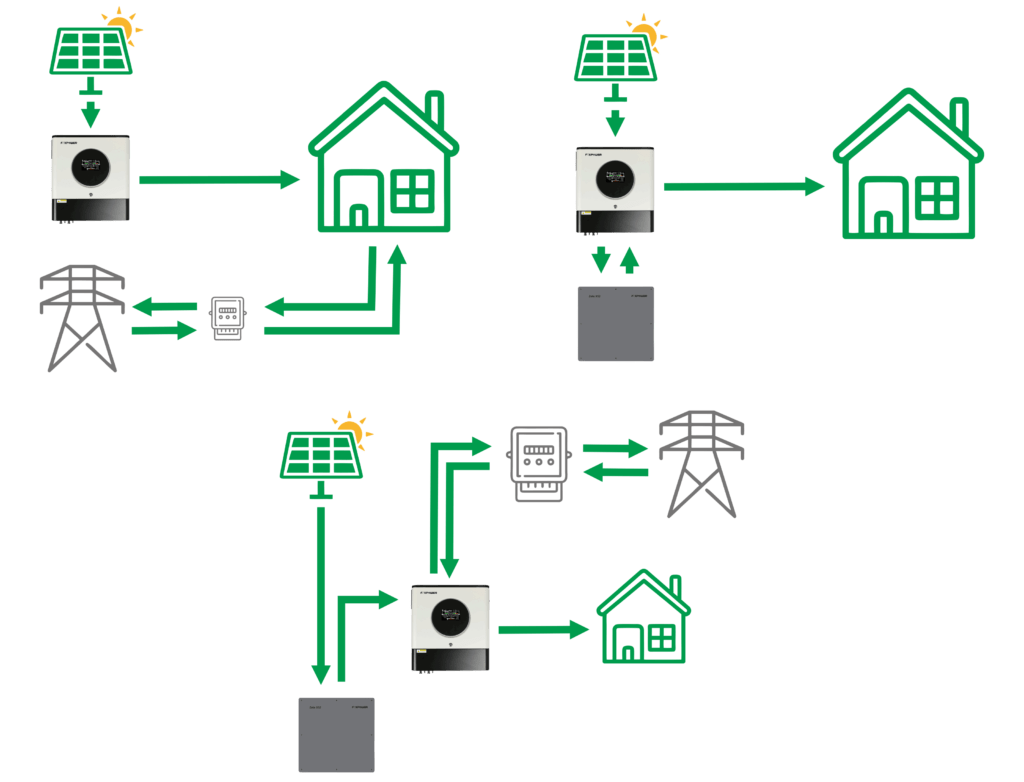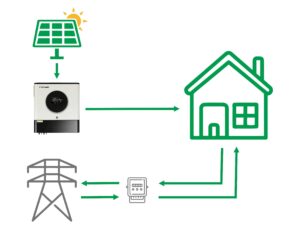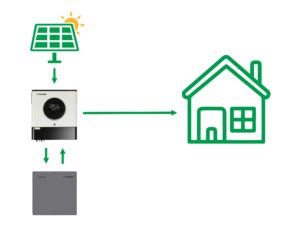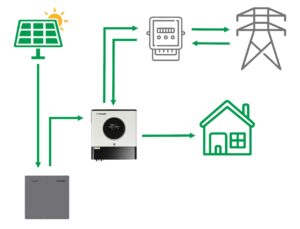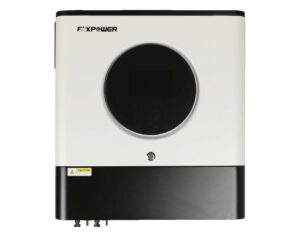Grid-tied, on-grid, utility-interactive, grid intertie and grid back-feeding are all terms used to describe the same concept – a solar system that is connected to the utility power grid.
The grid-tied inverter system boasts several advantages, especially in solar power generation systems. Here are some key benefits:
1.High-Efficiency Conversion: Inverters efficiently convert direct current generated by solar photovoltaic panels into usable alternating current, maximizing energy conversion efficiency.
2.Grid Connection: Grid-tied inverters enable seamless connection with the electrical grid, allowing excess generated energy to be fed back into the grid, providing users with additional income or offsetting electricity bills.
3.Energy Autonomy: When the solar system produces more energy than needed, surplus electricity can be sent back to the grid, creating a mechanism for energy autonomy.
4.Real-Time Monitoring: Grid-tied inverters typically come equipped with real-time monitoring capabilities, allowing users to track system performance, including energy generation, current output, and system status.
5.Environmental Sustainability: Grid-tied systems contribute to reducing dependence on traditional energy sources, increasing the proportion of renewable energy use, thereby lowering environmental impact and promoting sustainability.
6.Flexibility: These systems are designed to be flexible, adapting to various scales and types of solar power generation systems, from small residential setups to large commercial and industrial power systems.
7.Cost Savings: By injecting surplus solar power into the grid, users can reduce electricity costs and, in some cases, earn income from electricity sales.
8.Stable Power Supply: Grid-tied systems provide a stable power supply by flexibly sourcing energy from both the solar system and the grid, ensuring electricity supply even under various weather and lighting conditions.
In summary, grid-tied inverter systems offer an efficient, sustainable, and cost-effective solution for solar power generation, providing users with multiple economic and environmental benefits.
The off-grid inverter system, being independent of the main electrical grid, comes with several notable advantages. Here are the key benefits of an off-grid inverter system:
1.Independent Power Supply: The off-grid system can operate independently without reliance on the main electrical grid, providing users with a reliable power supply, particularly suitable for remote areas or places with frequent power outages.
2.Flexibility and Portability: Off-grid systems are suitable for temporary or mobile locations, such as outdoor events, camping sites, or construction sites, offering users a flexible energy solution.
3.Sustainability and Environmental Friendliness: Relying on solar photovoltaic panels for power generation, off-grid systems promote the use of renewable energy, reducing dependence on traditional sources and contributing to lower environmental impact.
4.Self-Sufficiency: Off-grid systems can be self-sufficient when exposed to abundant sunlight, storing surplus electricity for later use without relying on external power sources.
5.Emergency Backup Power: In the event of a main grid failure or emergencies, off-grid systems can serve as backup power sources, ensuring the operation of critical equipment and services.
6.Low Operating Costs: Since off-grid systems do not need to connect to the main electrical grid, they reduce transmission losses and often do not incur grid connection fees, resulting in lower operating costs.
7.Scalability: Off-grid systems can be flexibly expanded based on demand, allowing the addition of more solar photovoltaic panels or battery storage units to meet the growing energy needs of users.
Off-grid inverter systems provide users with a reliable, flexible, and environmentally friendly energy solution, particularly suitable for situations where independent or temporary power is required.
The hybrid inverter system combines the characteristics of both off-grid and grid-tied systems, offering several advantages. Here are the key benefits of a hybrid inverter system:
1.Flexibility: The hybrid inverter system can operate both independently and connected to the grid, providing a high degree of flexibility. Users can choose and switch between modes to adapt to varying energy needs and environmental conditions.
2.Stable Power Supply: In the presence of the grid, the hybrid inverter system can utilize it to provide a stable power supply. During grid outages, it can switch to off-grid mode, ensuring continuous power supply.
3.Self-Sufficiency: When sunlight is available, the hybrid inverter system can generate solar power and store surplus electricity. This allows the system to operate independently and reduce dependence on external power sources.
4.Grid Support: In grid-connected mode, the hybrid inverter system can support the grid by injecting excess electricity. Users can benefit economically through electricity sales or reduced utility bills.
5.Emergency Backup Power: In the event of grid failure or emergencies, the hybrid inverter system can serve as a backup power source, ensuring the continued operation of critical equipment.
6.Sustainable Development: Harnessing solar power, the hybrid inverter system contributes to the use of renewable energy, reducing dependence on non-renewable sources and promoting sustainable development.
7.Adaptability to Different Settings: The hybrid inverter system is suitable for various settings, including residential areas, commercial buildings, and remote locations, providing a flexible energy solution for diverse users.
The hybrid inverter system’s advantages lie in its flexibility, sustainability, and stability, offering users comprehensive options for energy management.
For the vast majority of homeowners, utilizing the public grid for electricity and energy storage is much cheaper and more practical than using battery packs and/or backup generators.
Regardless of your situation, FOXPOWER has extensive experience in every system type and can develop and install the best systems for you

